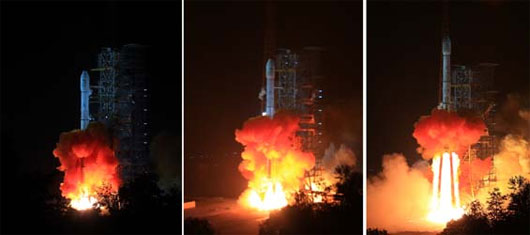Why does China aspire to explore the Moon?
The moon may be a great source of minerals and energy, a leading Chinese scientist said in a recent interview with the foreign news agency.
In the early morning of December 2, China launched the 3rd Russian spacecraft into space, aiming to land on the surface of the Moon to begin the exploration of Earth's natural satellite. This is the first Moon survey in the last 40 years, since Russia's unmanned mission in 1976.

The boosters for the Hang Nga 3 probe left the launch pad.(Photo: THX)
Just before the ship left the launch station, Professor Ouyang Ziyuan, adviser to the mission, had his first interview with foreign media, revealing some information about the ambitious space program but often kept secret of China. According to Ziyuan, Hang Nga 3 carries a self-propelled Rabbit robot that is expected to land on an ancient crater called Sinus Iridum on the surface of the Moon. The area of this nearly 400km wide volcanic mouth is believed to be relatively flat and without stones, convenient for geological exploration.
Mr. Ouyang explained the main motives behind China's ambition to explore the Moon as follows:
" First , it is to develop our technology, because the mission of exploring the Moon requires a variety of technologies, including communications, computers, all kinds of IT skills and usage. Various forms of matter, this is the key reason.
Second , in terms of science, extraterrestrial, we also want to know about our brothers and sisters like the Moon, its origins and evolution, so that we can know more about our own planet.
Third , in terms of talent, China needs to have a talented team of its own, who can explore the entire solar system and the moon. This is our main purpose. "
After two missions flying around the Moon's orbit, the next two missions of the Hang Nga ship will be landings and try to take samples from this celestial body to return to Earth. Finally, after completing all unmanned projects, China aims to bring people to the Moon. No one has set foot on the Moon since the American Apollo missions ended in 1972.
A deep cause for China's long-term program is "humans can use the Moon in many ways," as Ouyang commented. This top cosmology professor in China is also not afraid to express a shocking view on the exploitation of Earth's natural satellite.

If all goes well, the Hang Nga 3 ship carrying the self-propelled Rabbit robot is expected to land on the Moon's surface after about 15 days of flight.(Photo: Word Press)
Mr. Ouyang believes that, because the Moon possesses a very thin atmosphere, solar panels will operate much more efficiently than on Earth and "a solar belt" installed there can " meet the needs of the whole world ". In addition, the Moon is also rich in helium-3, a potential fuel for the operation of nuclear power plants, which can "solve human energy needs for at least 10,000 years".
Ouyang added: "The moon is abundant in resources, mainly rare earth elements, titanium and uranium, which the Earth is lacking. These resources can be used indefinitely. Now, it is not necessary to exploit them, because it will be very expensive. "
China's launch of the Hang Nga spaceship takes place at a time when the country is being regarded as "marching," by its neighbors in Asia, especially after the move to establish an air defense zone ( ADIZ) recently in Hoa Dong. Chinese officials emphasized the desire to cooperate with other countries in space projects, but their conquest of the Moon for them was a statement of national power.
In short, the mission of the Lunar Lunar Expedition of Hang Nga is particularly important for China. It is a national affirmation, the conquest of the peaks of technology and the desire to exploit all available natural resources.
Many analysts evaluate that China's ambition is hard to come true in the near future. Even so, the country has been careful and patient to build key elements for an advanced space program, from missile launchers, unmanned missions to Earth's orbit until Unmanned planetary lander. Beijing is also secretly investing heavily in these activities.
Professor Richard Holdaway, a leading British space scientist from the London-funded RAL Space lab, is also a person with a lot of experience in cooperating with China, believing that Beijing has absolutely Can take astronauts to the Moon by 2025.
- China plans to explore the Moon
- Acer announced four new laptop models
- New NASA research: Water and humans can be found on the Moon, so come back soon
- China will bring secret technology to the Moon
- China launches satellites to help explore the dark areas of the Moon
- China aspires to set foot on Mars in 2030
- China plans to explore the Moon's dark zone
- Russia is expected to send people to the Moon by 2020
- China launches the Lunar Explorer spacecraft
- Mr. Trump is determined to bring the Americans back to the Moon
- Acer Aspire iDea 500: All in one
- In 2007, China will launch satellite to explore the Moon
 Van Allen's belt and evidence that the Apollo 11 mission to the Moon was myth
Van Allen's belt and evidence that the Apollo 11 mission to the Moon was myth The levels of civilization in the universe (Kardashev scale)
The levels of civilization in the universe (Kardashev scale) Today Mars, the sun and the Earth are aligned
Today Mars, the sun and the Earth are aligned The Amazon owner announced a secret plan to build a space base for thousands of people
The Amazon owner announced a secret plan to build a space base for thousands of people